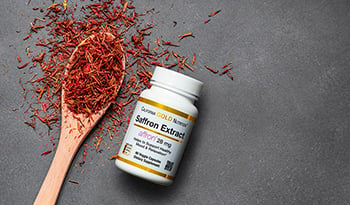白藜蘆醇:可能對精神健康有益的強大防氧化成分

白藜蘆醇是什麼?
白藜蘆醇(RSV)是一種天然的多酚,具有植物雌激素的功能。它存在於漿果、堅果、葡萄和其他廣泛使用於亞洲醫學的植物來源中。來自動物和人體試驗的累積研究結果,顯示白藜蘆醇的防炎和防氧化作用可能對多種醫學和精神疾病有好處,但大多數人類臨床試驗的結果受到研究設計缺陷和样本量小的限制。白藜蘆醇可能會引起的基因表達變化和熱量限制所導致的類似,因此其對延長壽命的潛在影響正在被研究,但是對非人類靈長類動物的研究結果並不一致。
白藜蘆醇如何起作用?
白藜蘆醇對情緒、焦慮和認知功能的效益可能是由多種機制介導。有越來越多的研究結果指出,白藜蘆醇可能有預防神經退行性疾病的作用,並可能會減慢認知症狀的發展速度。一些動物研究顯示,白藜蘆醇可能對帕金森氏症、亨廷頓舞蹈症、多發性硬化症、阿茲海默症和其他神經退行性疾病具有神經保護作用。根據一些活體研究,白藜蘆醇可遏抑磷酸二酯酶4,產生類似抗抑鬱藥和抗焦慮藥的作用。最近發表的一項研究報稱,在一個躁狂症動物模型中,白藜蘆醇在許多大腦區域中預防和逆轉了對蛋白質和脂質的氧化損傷。白藜蘆醇有助於降低代謝症候群的風險,從而減少了身體和大腦的發炎;可促進腦動脈血管舒張;對內側皮質和下丘腦區域有直接的神經保護作用;因此,白藜蘆醇可能對阿茲海默症有益處。最後,白藜蘆醇在DNA中誘導表觀遺傳變化,這可能會降低患上各種慢性疾病的風險。
白藜蘆醇如何改善認知功能?
動物試驗和幾個人類臨床試驗的積累研究結果,導致人們對白藜蘆醇這些可能性的興趣日益濃厚:增強健康成年人的認知功能、以及作為阿茲海默症和其他退行性神經系統疾病的潛在療法。
迄今為止,關於白藜蘆醇和其他植物雌激素對健康人群認知方面的作用,研究結果並不一致,這可能反映了劑量、研究持續時間和評估認知功能的試驗的差異。健康的男性接受白藜蘆醇(250至500毫克)的短期治理後,腦血流量呈劑量依賴性增加,但認知功能並未改善。在一項為期4週的研究中,接受500毫克白藜蘆醇療程的健康成年人報告其疲勞程度顯著降低,但認知能力沒有變化。在一項為期26週的研究中,健康的超重老年人接受結合了白藜蘆醇和槲皮素的療程後,記憶力有所改善、海馬體的功能連接性增強、大腦葡萄糖代謝提高。對於健康的老年人,白藜蘆醇中可能具有增強認知的作用。一個系統性評估分析了23項隨機對照試驗,發現老年男性和絕經後女性每天服用白藜蘆醇150至200毫克至少14週後,認知功能有小至中度的改善。認知功能改善與腦血流量改善相關。
白藜蘆醇等多酚類化合物可能有預防阿茲海默症的作用,因此引起了越來越多的研究興趣,然而,這項工作仍處於非常早期的階段,只進行過幾個臨床試驗。一項為期52週的安慰劑對照雙盲多中心第二階段研究,探索了白藜蘆醇的安全性和耐受性;在研究中,被診斷患有輕度至中度阿茲海默症(AD)的個人(N = 119)被隨機分為安慰劑組與白藜蘆醇組。白藜蘆醇組的個人開始劑量為每天500毫克,每13週增加500毫克,直至達到每天2000毫克的最大劑量。研究進行期間收集的數據包括AD的生物標記、容積磁共振造影和臨床結果。研究發現,白藜蘆醇組的人的CSF生物標記水平下降得比較慢,這可能反映了腦內β類澱粉蛋白質的積累減少。值得注意的是,白藜蘆醇組的MMP-9水平也降低了(AD相關的神經變性過程的風險增加,被認為與MMP-9這種生物標記有關)。這個發現顯示,白藜蘆醇可降低血腦屏障對促炎分子的通透程度,從而發揮直接的神經保護作用。最常見的不良反應是噁心、腹瀉和體重減輕。一項回顧性研究對一個AD患者子集進行了分析,這些受試者都是在上述的第2階段研究中接受了白藜蘆醇的患者。結果顯示,與安慰劑組相比,CSF和血漿生物標記均明顯好轉,而日常生活活動(ADL)測量的分數也有所改善。要分析與白藜蘆醇相關的AD生物標記變化的重要性,需要進一步的研究。
白藜蘆醇和抑鬱症
白藜蘆醇作為治理情緒低落的潛在方法,研究還處於非常早期的階段。根據活體和動物研究的結果,對於氧化應激和發炎引致的、可能表現為情緒低落的腦部病理變化,白藜蘆醇可能具有神經保護作用。在這些發現促使下,對白藜蘆醇作為潛在抗抑鬱劑的興趣最近在增加。
白藜蘆醇安全嗎?
對於通常建議劑量的白藜蘆醇,一般人都有很好的耐受性。白藜蘆醇最常見的副作用是腹瀉、噁心和體重減輕。據報告,每天兩次2000毫克的高劑量會產生更嚴重的副作用。尚未有不良的藥物相互作用的報告,但是已知高劑量的白藜蘆醇會遏抑細胞色素P450酶,因而可能導致與許多藥物的相互作用。
如何充分利用白藜蘆醇補充品
一個正在進行的重要研究領域涉及具有更高生物利用度的產品開發,旨在增加白藜蘆醇對身體和大腦的潛在益處。白藜蘆醇穩定性低、暴露於熱和光下會迅速氧化、水溶性低、被肝臟吸收的比率高,因此其生物利用度低,如果單獨服用,對認知 的潛在益處可能會受到限制。活體和動物研究的結果顯示,與其他天然產品合用時,白藜蘆醇於不同臨床適應症的生物利用度和功效均可能得到增強。最近的一項研究發現,白藜蘆醇與胡椒鹼合用可顯著提高其於大腦的生物利用度,並導致腦血流量增加,但並未改善認知功能或情緒。要闡明遺傳差異、年齡、性別、飲食和微生物的變異如何影響白藜蘆醇的生物利用度,需要進行大規模的動物和人類試驗。生物利用度在不同的個人中表現的差異,意味著白藜蘆醇的最低有效劑量(單獨服用、或與其他天然產品一起服用、或作為藥物的輔助手段服用)需要逐案評估。
有人正在致力以新的遞送系統和半合成衍生物來改善白藜蘆醇的生物利用度,包括以脂質納米載體、脂質體、納米乳劑和其他方法進行納米封裝。據報告,已經出現了有前景的早期結果,但是還需要進行更多的活體研究,以鑑定適合臨床使用的安全方法。
白藜蘆醇是有前景的化合物
白藜蘆醇將來有望成為許多疾病和神經精神障礙的重要非藥物療法。白藜蘆醇作為阿茲海默症的認知能力下降、其他神經退行性疾病和情緒低落的潛在療法,研究仍處於早期階段。迄今為止,大多數研究證據均來自動物研究。人體臨床試驗只進行了幾個,大部分均是以健康的人為對象。需要進行長期的大型安慰劑對照人類臨床試驗,以評估白藜蘆醇的安全性、進一步了解它與其他天然產品或藥劑的潛在相互作用、確定可提高生物利用度的配方、以及確定用於疾病和神經精神障礙的理想安全劑量。
參考文獻:
- Adeghate E, Donath T, Adem A. (2013) Alzheimer disease and diabetes mellitus: do they have anything in common?Curr Alzheimer Res.; 10:609–617.
- Amri A, Chaumeil JC, Sfar S, Charrueau C. (2012) Administration of resveratrol:What formulation solutions to bioavailability limitations?J Control Release.; 158:182–193.
- Baur JA, Sinclair DA. (2006) Therapeutic potential of resveratrol: the in vivo evidence.Nat Rev Drug Discov.; 5:493–506.
- Blanchet J, Longpre F, Bureau G, Morissette M, DiPaolo T, et al (2008) Resveratrol, a red wine polyphenol, protects dopaminergic neurons in MPTP-treated mice.Prog Neuropsychopharmacol Biol Psychiatry.; 32:1243–1250.
- Chimento, A., De Amicis, F., Sirianni, R., Stefania, M. et al (2019) Progress to Improve Oral Bioavailability and Beneficial Effects of Resveratrol J Mol Sci.; 20(6):1381.
- Colman RJ, Beasley TM, Kemnitz JW, Johnson SC, Weindruch R, Anderson RM. (2014) Caloric restriction reduces age-related and all-cause mortality in rhesus monkeys.Nat Commun.; 5:3557.
- Cottart CH, Nivet-Antoine V, Beaudeux JL. (2014) Review of recent data on the metabolism, biological effects, and toxicity of resveratrol in humans.Mol Nutr Food Res.; 58:7–21.
- De Santi SC, Pietrabissa A, Spisni R, Mosca F, Pacifici GM. (2000) Sulphation of resveratrol, a natural compound present in wine, and its inhibition by natural flavonoids.Xenobiotica.; 30:857–866.
- Dhakal S, Kushairi N, Phan CW, Adhikari B, Sabaratnam V., et al (2019) Dietary Polyphenols:A Multifactorial Strategy to Target Alzheimer's Disease.Int J Mol Sci.;20(20). pii:E5090.
- Farhan M, Ullah MF, Faisal M, Farooqi AA, Sabitaliyevich UY, et al (2019) Differential Methylation and Acetylation as the Epigenetic Basis of Resveratrol's Anticancer Activity.Medicines (Basel). 13;6(1). pii:E24.
- Foti Cuzzola V, Ciurleo R, Giacoppo S, Marino S, Bramanti P.(2011) Role of resveratrol and its analogues in the treatment of neurodegenerative diseases: focus on recent discoveries.CNS Neurol Disord Drug Targets.; 10:849–862.
- Johnson JJ, Nihal M, Siddiqui IA, Scarlett CO, Bailey HH, et al (2011) Enhancing the bioavailability of resveratrol by combining it with piperine.Mol Nutr Food Res.; 55:1169–1176.
- Kennedy DO, Wightman EL, Reay JL, Lietz G, Okello EJ, et al (2010) Effects of resveratrol on cerebral blood flow variables and cognitive performance in humans: a double-blind, placebo-controlled, crossover investigation.Am J Clin Nutr.; 91:1590–1597.
- Kim D, Nguyen MD, Dobbin MM, Fischer A, Sananbenesi F, et al (2007) SIRT1 deacetylase protects against neurodegeneration in models for Alzheimer's disease and amyotrophic lateral sclerosis.EMBO J.; 26:3169–3179.
- Kumar P, Padi SS, Naidu PS, Kumar A. (2006) Effect of resveratrol on 3-nitropropionic acid-induced biochemical and behavioural changes: possible neuroprotective mechanisms.Behav Pharmacol. 17:485–492.
- La Porte C, Voduc N, Zhang G, Seguin I, Tardiff D, Singhal N, Cameron DW. (2010) Steady-State pharmacokinetics and tolerability of trans-resveratrol 2000 mg twice daily with food, quercetin and alcohol (ethanol) in healthy human subjects.Clin Pharmacokinet.; 49:449–454.
- Mattison JA, Roth GS, Beasley TM, Tilmont EM, Handy AM, et al (2012) Impact of caloric restriction on health and survival in rhesus monkeys from the NIA study.Nature.; 489:318–321.
- Maturitas. 2014 Mar;77(3):209-20.Phytoestrogens and cognitive function: a review.Soni M1, Rahardjo TB2, Soekardi R2, Sulistyowati Y2, Lestariningsih2, Yesufu-Udechuku A3, Irsan A4, Hogervorst E5.
- Menegas S, Ferreira CL, Cararo JH, Gava FF, et al (2019) Resveratrol protects the brain against oxidative damage in a dopaminergic animal model of mania.Metab Brain Dis.;34(3):941-950.
- Mercken EM, Carboneau BA, Krzysik-Walker SM, de Cabo R. (2012) Of mice and men: the benefits of caloric restriction, exercise, and mimetics.Ageing Res Rev.; 11:390–398.
- Miller RA, Harrison DE, Astle CM, Baur JA, Boyd AR, et al (2011) Strong R. Rapamycin, but not resveratrol or simvastatin, extends life span of genetically heterogeneous mice.J Gerontol A Biol Sci Med Sci.; 66:191–201.
- Moussa C, Hebron M, Huang X, Ahn J, Rissman RA., et al (2017) Resveratrol regulates neuro-inflammation and induces adaptive immunity in Alzheimer's disease.J Neuroinflammation. 2017 Jan 3;14(1):1.
- Pearson KJ, Baur JA, Lewis KN, Peshkin L, Price NL, et al (2008) Resveratrol delays age-related deterioration and mimics transcriptional aspects of dietary restriction without extending life span.Cell Metab.; 8:157–168.
- Popat R, Plesner T, Davies F, Cook G, Cook M, et al (2013) A phase 2 study of SRT501 (resveratrol) with bortezomib for patients with relapsed and or refractory multiple myeloma.Br J Haematol.; 160:714–717.
- Santos AC, Veiga F, Ribeiro AJ. (2011) New delivery systems to improve the bioavailability of resveratrol.Expert Opin Drug Deliv. 2011 Aug;8(8):973-90.
- Shindler KS, Ventura E, Dutt M, Elliott P, Fitzgerald DC, Rostami A. (2010) Oral resveratrol reduces neuronal damage in a model of multiple sclerosis.J Neuroophthalmol.; 30:328–339.
- Smoliga JM, Colombo ES, Campen MJ. (2013) A healthier approach to clinical trials evaluating resveratrol for primary prevention of age-related diseases in healthy populations.Aging (Albany NY).; 5:495–506.
- Soni M, White LR, Kridawati A, Bandelow S, Hogervorst E. (2016) Phytoestrogen consumption and risk for cognitive decline and dementia:With consideration of thyroid status and other possible mediators.J Steroid Biochem Mol Biol.;160:67-77.
- Strong R, Miller RA, Astle CM, Baur JA, de Cabo R, et al (2013) Evaluation of resveratrol, green tea extract, curcumin, oxaloacetic acid, and medium-chain triglyceride oil on life span of genetically heterogeneous mice.J Gerontol A Biol Sci Med Sci.; 68:6–16.
- Sun AY, Wang Q, Simonyi A, Sun GY. (2010) Resveratrol as a therapeutic agent for neurodegenerative diseases.Mol Neurobiol.; 41:375–383.
- Zhu X, Li W, Li Y, Xu W, Yuan Y, et al (2019) The antidepressant- and anxiolytic-like effects of resveratrol:Involvement of phosphodiesterase-4D inhibition.Neuropharmacology. 15;153:20-31.
- Turner RS, Thomas RG, Craft S, van Dyck CH, Mintzer J. et al (2015) A randomized, double-blind, placebo-controlled trial of resveratrol for Alzheimer disease. Neurology. 2015 Oct 20;85(16):1383-91.
- Wang F, Wang J, An J, Yuan G, Hao X, Zhang Y., (2018) Resveratrol ameliorates depressive disorder through the NETRIN1-mediated extracellular signal-regulated kinase/cAMP signal transduction pathway.Mol Med Rep.;17(3):4611-4618.
- Wightman EL, Haskell-Ramsay CF, Reay JL, Williamson G, Dew T., et al (2015) The effects of chronic trans-resveratrol supplementation on aspects of cognitive function, mood, sleep, health and cerebral blood flow in healthy, young humans.Br J Nutr. 14;114(9):1427-37.
- Wightman EL, Reay JL, Haskell CF, Williamson G, Dew TP, Kennedy DO. (2014) Effects of resveratrol alone or in combination with piperine on cerebral blood flow parameters and cognitive performance in human subjects: a randomised, double-blind, placebo-controlled, cross-over investigation.Br J Nutr.; 112:203–213.
- Witte AV, Kerti L, Margulies DS, Floel A. (2014) Effects of Resveratrol on Memory Performance, Hippocampal Functional Connectivity, and Glucose Metabolism in Healthy Older Adults.J Neurosci.; 34:7862–7870.
- Zaw, T., Howe, P., Wong, R. (2017) Does phytoestrogen supplementation improve cognition in humans?A systematic review.Ann N Y Acad Sci.;1403(1):150-163.
免責聲明:本健康中心不提供診斷⋯

















































































 目錄
目錄
















